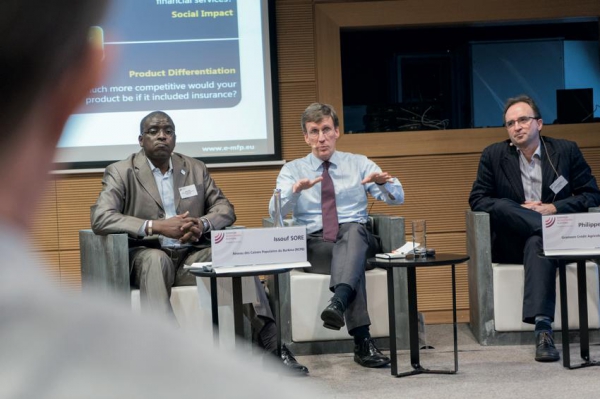MFIs and agricultural credit and insurance: does it have to be an unhappy marriage?
- Phillipe GUICHANDUT, Grameen Crédit Agricole Microfinance Foundation
- Paul CASTLE, Foundation Syngenta
- Issouf SORE, Réseau des Caisses Populaires du Burkina (RCPB)
PRESENTATIONS
Phillipe GUICHANDUT opened this session by welcoming the speakers, the audience and introducing also the Microinsurance Network (MIN), as this session was part of the activity of the Agri Working Group of the MIN. Guichandut gave an introduction to microinsurance for agriculture, stressing that index-based insurance is a tool with the potential to reduce smallholder vulnerability, enhance food security and support productivity by unlocking access to credit and investment in agriculture. The index-based approach reduces administrative costs and allows for utilization at different levels. Nevertheless, challenges remain in terms of matching the actual loss and pay-out (“basis risk”), delivering at scale and low-cost as well as gaining the trust of farmers. Guichandut finished by inviting the panel to address the question of why few stakeholders in microfinance are involved in agrifinance and whether MFIs are the most appropriate partners to deliver microinsurance in agriculture.
Issouf SORE expressed his conviction that microinsurance would be an asset to MFIs. He introduced Réseau des Caisses Populaires du Burkina (RCPB), the largest credit and savings co-operative network in Burkina Faso and its pilot project with PlaNet Guarantee, a microinsurance broker, to establish an agricultural insurance. Sore underlined that only 10 percent of their portfolio is dedicated to agriculture finance. Within this pilot, RCPB serves as intermediary between PlaNet Guarantee and farmers. Now in its second year, the pilot project has experienced a sharp increase in beneficiaries, but challenges in terms of limited awareness and high costs remain. Sore stressed the importance of educational training and the role of MFIs in the process as well as the importance of lobbying for subsidies to reduce the combined costs of insurance and credit to farmers. Sore concluded that as yield risks caused by climate change will increase, microinsurance will be crucial to safeguard people’s livelihood, ensure the sector’s financing, improve national productivity and enhance food security.
Paul CASTLE shared experiences of The Agriculture and Climate Risk Enterprise (ACRE), a commercial company created to reduce the burden of weather and other risks for small farmers. The company launched by the Syngenta Foundation in 2014, uses different delivery channels, including agribusinesses and NGOs. Castle highlighted that ideally ACRE also works together with MFIs as the program aspires to link insurance with credit. Education is an important part of ACRE in order to create demand. Firstly, smallholders and MFIs need to be made aware and educated on index-based insurance to create understanding and trust. Secondly, key questions that need to be addressed to create understanding among MFIs include: 1) The social impact addressing how many farmers would improve their livelihoods due to better access to financial services; 2) the portfolio growth addressing how many more MFIs would lend if most of the risks were covered; 3) the product differentiation involving the extent to which MFIs would increase their competitiveness if it included insurance; and 4) finally the portfolio protection encompassed by how much MFIs would reduce their loan defaults. MFIs’ concern about how smallholders can be protected if beneficiaries cannot repay loans especially needs to be addressed. Castle finished his presentation by stating that he is optimistic that MFIs and agricultural insurance can be brought together.
DISCUSSION

Guichandut opened the discussion by asking Sore about the costs for farmers. Sore highlighted that although the insurance adds to the costs of credit, it has an advantage to the insured person since it reduces the risks of yield uncertainties. Castle, addressed Guichandut’s question about advantages and disadvantages when working together with MFIs. He emphasized that, while NGOs are appropriate partners to introduce a large number of farmers to a new product, MFIs are appropriate actors to distribute the product combination of credit and insurance. Nevertheless, the program is open to other partners, provided that these are able to educate credit institutions and the public at large. Moreover, new partners should ideally also be able to combine credit and insurance in their product offer.
Sore, answering whether the risk in Burkina Faso is not the lack of irrigation rather than drought, stressed that the country has a national strategy to ensure irrigation using water from reservoirs. However, famers in the country are 95 percent dependent on actual rainfall while also floods represent a risk, Sore concluded that this vulnerability shows that more needs to be done than simply irrigation.
Addressing the question of subsidies, Castle stated that subsidies should always be avoided since the constant flow of subsidies can often not be assured in countries. Sore disagreed by highlighting that beneficiaries are generally receptive to insurance and loans as long as product affordability is assured. He underlined his point with the fact that in Europe around 50 percent of agriculture is subsidized - compared to only 3 percent in Africa. Guichandut ended the session by stating that although some questions remain, there is certainty that the combination of MFIs and agricultural credit and insurance will work, as long as the governance of MFIs show a strong motivation to do so.
